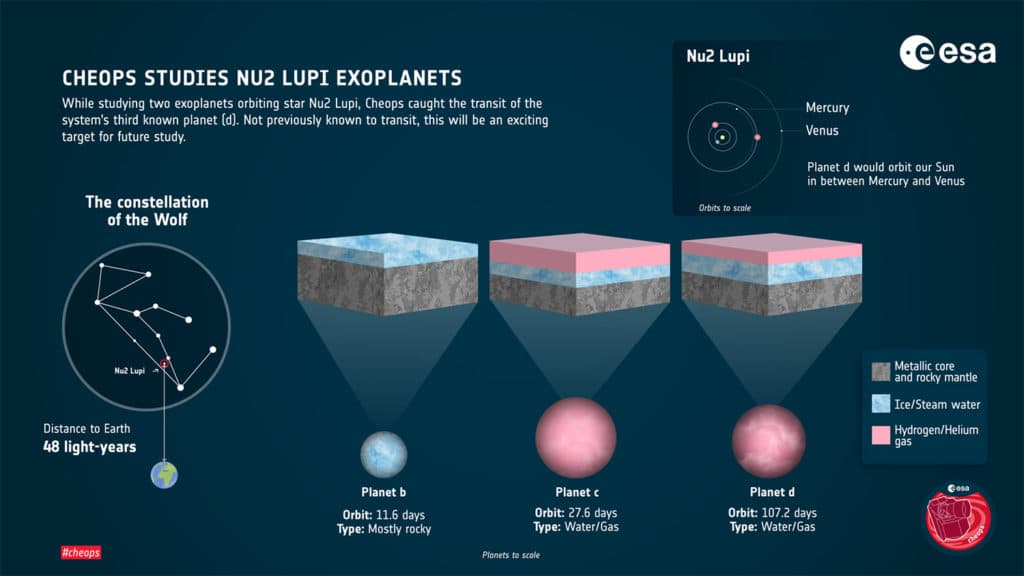The CHEOPS satellite accidentally spotted a rare exoplanet with no known equivalent. The satellite detected this unique exoplanet while looking for two exoplanets in a bright nearby star system.
This planet called ‘Nu2 Lupi d’ is located 50 light-years away in the constellation Lupus (Latin for Wolf), around a star called Nu2 Lupi. It is about 2.5 times the size of Earth and almost 9 times its mass.
What’s more, scientists used measurements with archival data from other observatories and numerical models to characterize the density and composition of the planet and its neighbors. They found that the planet has a rocky interior. It has far more water than the Earth. However, the water is not liquid; instead of taking high-pressure ice or high-temperature steam, making the planets uninhabitable.
The CHEOPS satellite was two exoplanets in a nearby planetary system that was found in 2019. In 2019, Swiss astronomers announced the detection of three exoplanets around this bright, Sun-like star. The three exoplanets have masses between those of Earth and Neptune (17 times the Earth) and take 12, 28, and 107 days to circle their parent star.
Yann Alibert, professor of astrophysics at the University of Bern and co-author of the study, said, “We knew that already for the two inner planets, which led us to point CHEOPS to the system in the first place. However, the third planet is quite far away from the star; no one was expected to see its transit!”
“This proved a game-changer, as it is the first time an exoplanet with a revolution period of over 100 days has been spotted transiting a star that is bright enough to be visible to the naked eye.”

David Ehrenreich, professor at the University of Geneva and mission scientist of CHEOPS, who co-signed the study, said, “Due to its relatively long period, the amount of stellar radiation reaching the planet is mild in comparison to many other discovered exoplanets. The less radiation a planet receives, the less it changes over time. Therefore, a planet with a long period could have retained more information about its origin.”
“But so far, the few such exoplanets astronomers had found orbited faint stars. In other words: little of their light reaches Earth and therefore makes them difficult to study. Not this time: Since its bright host star is quite close to us, it is easier to study. This makes it a golden target for future study with no known equivalent.”
Photobomb is a term for an object when it suddenly enters into the camera’s field of sight during the taking of a photograph. The same case happened with CHEOPS. The satellite was taking pictures of a planetary system 50 light-years away, and suddenly it spotted this unique exoplanet photobomb.
The team was led by the Universities of Geneva and Bern and members of the National Center of Competence in Research PlanetS.
Journal Reference:
- Delrez, L., Ehrenreich, D., Alibert, Y. et al. Transit detection of the long-period volatile-rich super-Earth ν2 Lupi d with CHEOPS. Nat Astron (2021). DOI: 10.1038/s41550-021-01381-5
"exciting" - Google News
July 29, 2021 at 02:22PM
https://ift.tt/3iZs3hD
A ‘Very Exciting’ unique exoplanet has more water than earth - Tech Explorist
"exciting" - Google News
https://ift.tt/2GLT7hy
Shoes Man Tutorial
Pos News Update
Meme Update
Korean Entertainment News
Japan News Update
Bagikan Berita Ini














0 Response to "A ‘Very Exciting’ unique exoplanet has more water than earth - Tech Explorist"
Post a Comment